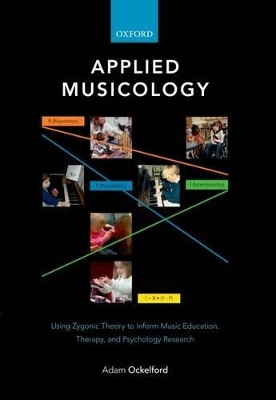
Applied Musicology
Oxford University Press (Verlag)
978-0-19-960763-1 (ISBN)
Although research in music psychology, education and therapy has expanded exponentially in the 21st century, there is something of a 'black hole' around which much of the discourse circles: music itself. While writers have largely been occupied with what people think about musical engagement, the little musical analysis that exists has tended to be at a low level compared to the sophisticated non-musical exploration that is present. This highlights the tenuous connection between musical enquiry in the context of the humanities and that occurring within the social sciences, the one exception being the partial intersection of music theory and psychology. Here, however, progress has largely been in one direction, with something of the objectivity that characterizes psychological research reading across to music analysis, and taking the form of what has been called 'empirical musicology'.
'Applied Musicology' takes a further, reciprocal step, in which certain of the techniques of empirical musicology (in particular, the author's 'zygonic' theory) are used to inform thinking in the domains of music-psychological, educational and therapeutic research. Within the book, the authors sketches out a new, interdisciplinary sphere of endeavour, for which the term 'applied musicology' is coined. The book adopts a phenomenological, inductive approach, using the analysis of hundreds of real-life examples of musical engagement and interaction in order to build new theories of musical intentionality and influence, and to shed new light on our understanding of aspects of music perception and cognition.
Intended for those in the fields of music psychology, music education, and musicology, Applied Musicology will lay the foundations upon which a new category of interdisciplinary work will be built.
Adam is Professor of Music and Director of the Applied Music Research Centre at the University of Roehampton in London. He has had a lifelong fascination for music, as a composer, performer, teacher and researcher. While attending the Royal Academy of Music, Adam started working with children with special needs - a number of whom, he noticed, had special musical abilities too - and he became interested in how we all intuitively make sense of music, without the need for formal education. Adam pursued this line of enquiry, and gained a PhD in music at Goldsmith's College in London in 1993, in which he set out his 'zygonic' theory of musical understanding. This theory has proved a valuable tool in music theory and analysis, in investigating musical development, and exploring interaction in music therapy and education. Adam is Secretary of the Society for Education, Music and Psychology Research ('SEMPRE'), and Chair of Soundabout, an Oxfordshire-based charity.
Foreword ; Preface ; RATIONALE AND THEORETICAL CONTEXT ; 1. Introduction ; 2. Music Theory and the Zygonic Approach ; APPLYING ZYGONIC THEORY TO INVESTIGATE MUSIC EDUCATION, THERAPY AND PSYCHOLOGICAL ASSESSMENT ; 3. Gauging Intentionality in Musical Interaction in Educational, Therapeutic and Diagnostic Contexts ; 4. From Intentionality to Influence: Gauging the Impact of One Performer on Another in Improvised Musical Dialogues ; 5. Modelling Musical Development in Children with Complex Needs: The Sounds of Intent Project ; APPLYING ZYGONIC THEORY TO EXPLORE EXCEPTIONAL MUSICAL ABILITIES ; 6. On Absolute Pitch, and the Disaggregation of Chords ; 7. Exploring Learning, Memory and Creativity in a Musical Savant ; APPLYING ZYGONIC THEORY TO PROBE MUSIC-STRUCTURAL COGNITION ; 8. Why Knowing What's Going to Happen Next Makes Anticipation in Music All the Sweeter ; 9. Can Music Survive without Listening Grammars? Studies in the Perception of Atonality ; THE FUTURE OF APPLIED MUSICOLOGY ; 10. Conclusion
| Verlagsort | Oxford |
|---|---|
| Sprache | englisch |
| Maße | 186 x 247 mm |
| Gewicht | 1076 g |
| Themenwelt | Kunst / Musik / Theater ► Musik ► Musiktheorie / Musiklehre |
| Geisteswissenschaften ► Psychologie ► Entwicklungspsychologie | |
| Geisteswissenschaften ► Psychologie ► Pädagogische Psychologie | |
| Geisteswissenschaften ► Psychologie ► Sozialpsychologie | |
| ISBN-10 | 0-19-960763-X / 019960763X |
| ISBN-13 | 978-0-19-960763-1 / 9780199607631 |
| Zustand | Neuware |
| Informationen gemäß Produktsicherheitsverordnung (GPSR) | |
| Haben Sie eine Frage zum Produkt? |
aus dem Bereich


